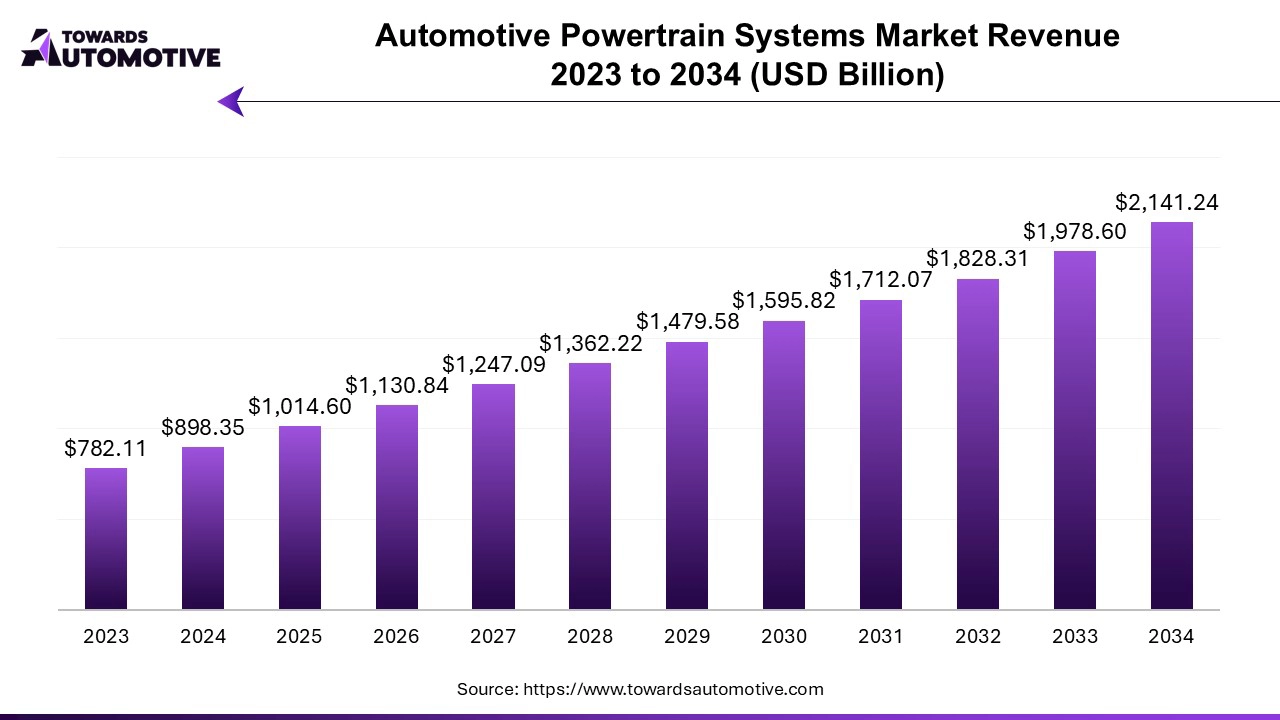The global automotive powertrain systems market size is calculated at USD 898.35 billion in 2024 and is expected to be worth USD 2141.24 billion by 2034, expanding at a CAGR of 8.22% from 2024 to 2034.

Get All the Details in Our Solution – Download Brochure @ https://www.towardsautomotive.com/download-brochure/1245
Key Takeaways
- Asia Pacific dominated automotive powertrain systems market.
- Europe is expected to grow with a significant CAGR during the forecast period.
- By propulsion type, the Internal Combustion Engine (ICE) segment held the largest share of the market.
- By vehicle type, the passenger vehicle segment led the industry.
Supply Chain Issues along with Regulatory Hurdles Issues Hampers the Market Growth
The automotive powertrain systems market faces several restraints that may hinder its growth. One significant challenge is the high cost of advanced powertrain technologies, including electric and hybrid systems, which can deter consumers from making the switch from traditional internal combustion engines. Additionally, the lack of charging infrastructure for electric and hybrid vehicles, especially in developing regions, poses a significant barrier to widespread adoption. Regulatory complexities and varying standards across different markets can also impede manufacturers’ ability to innovate and introduce new powertrain solutions efficiently. Furthermore, the global supply chain disruptions and component shortages can adversely affect production timelines and costs.
Rising Focus on Hydrogen Fuel Cells to Shape the Future Landscape
Hydrogen fuel cells are emerging as a significant opportunity in the automotive powertrain systems market, driven by their potential to provide clean and efficient energy solutions. As the automotive industry increasingly focuses on reducing carbon emissions, hydrogen fuel cells offer an attractive alternative to traditional internal combustion engines and even battery electric vehicles. These fuel cells generate electricity through a chemical reaction between hydrogen and oxygen, producing only water as a byproduct, which aligns perfectly with global sustainability goals.
Additionally, hydrogen fuel cells can be refueled quickly, similar to conventional gasoline vehicles, addressing one of the major challenges of battery electric vehicles—long charging times. This quick refueling capability makes them particularly appealing for commercial applications, such as buses and heavy-duty trucks, where downtime needs to be minimized. The expanding hydrogen infrastructure, driven by investments from governments and private sectors, further enhances the feasibility of hydrogen fuel cells as a mainstream powertrain solution.
As research and development continue to advance the efficiency and reduce the costs of hydrogen production and storage, the automotive powertrain market is likely to witness increased adoption of fuel cell technology, opening new avenues for manufacturers and creating a competitive edge in a rapidly evolving market landscape.
- In September 2024, BMW announced that it will launch a hydrogen powered powertrain in 2028. This project is executed with an exclusive partnership with Toyota.
Invest in Our Premium Strategic Solution @ https://www.towardsautomotive.com/price/1245
You can place an order or ask any questions, please feel free to contact us at sales@towardsautomotive.com
Explore the comprehensive statistics and insights on automotive industry data and its associated segmentation: Get a Subscription
For Latest Update Follow Us: https://www.linkedin.com/company/towards-automotive
